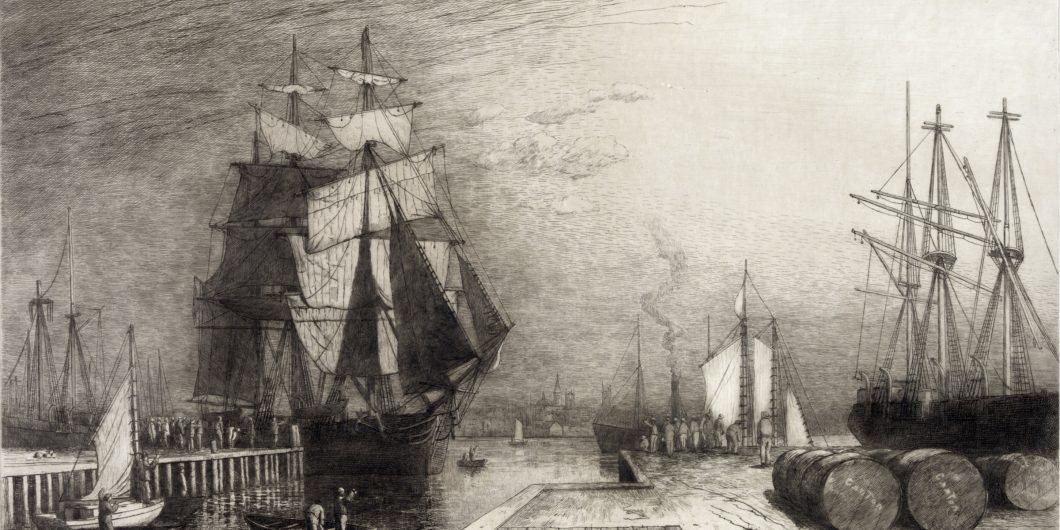Progressives will never understand violent incidents until they look to human nature itself.
Melville’s Rejection of Utopia
That Herman Melville became a writer in the first place—and later the author of the Great American Novel, as some people think of Moby-Dick—would have surprised his father, Allan, who said (when Melville was seven) that he was “very backward in speech & somewhat slow in comprehension.” His older brother, Gansevoort, was the one destined for greatness, his parents thought, but that all changed when Allan died in 1832 after declaring bankruptcy two years earlier. Herman was 12, Gansevoort, 16, and both suddenly had to find their own way in the world with limited support from extended family.
The younger Melville worked as clerk in a local bank before attending a couple of schools, first in Albany, then in Lansingburgh, New York. He taught school briefly, worked on his uncle’s farm, and then eventually set out to sea as a cabin boy in 1839 on the St. Lawrence to London. He was 20 at the time. In 1841, he joined the crew of the whaling ship, Acushnet, and wouldn’t return home until 1844, when he took up to writing, churning out a novel a year for the next seven years, starting with Typee in 1846.
But he also became involved with the “Young America” movement. The American editor of Typee, Evert Duyckinck, was a vocal member. The New York Young Americans “were proud, raw, and strident,” Andrew Delbanco writes in Melville: His World and His Work, “less cerebral than the ‘transcendentalists’ of New England and more comfortable with the populist rhetoric of the Democratic Party.”
Politically, they were committed to free trade, low tariffs, and American expansion both on the North American continent and abroad (with differing views on whether this included expanding slavery or not). The goal was to remake American society and—of particular interest to Melville—launch a new American literature on the basis of a “different relative attitude towards God, towards the objective universe,” as Walt Whitman put it in his afterward to Leaves of Grass—a God that is only immanent, equal with the universe rather than outside and above it. God would not save the world, but America might, by subduing it and transforming it in light of the new “scientific” thinking.
Until relatively recently, it was common for scholars to read Melville as an unfailing proponent of the new thinking. Even as recently as fifteen years ago, Giles Gunn writes in A Historical Guide to Herman Melville that Moby-Dick stages “the death throes of an old civilization and the emergence of a new.” Sure, Ishmael goes through hell aboard the Pequod under the rule of a satanic Ahab who is, for Gunn, a symbol of “1,900 years of Western thought with its fruitless engagement with the problem of evil,” but Ishmael emerges safe in the end, with his “free and easy sort of genial, desperado philosophy,” as Melville characterizes him at one point in the novel. The “Ishmael who returns to tell the story and reflect broadly on his experience is Melville’s prototype of the modern man—egalitarian and liberationist in his relation to others, to conventional beliefs and practices, and to his own body.”
In Herman Melville’s Ship of State, Will Morrisey argues convincingly that Moby-Dick in fact offers a critique of the premises and political goals of the Young America movement—premises and goals that are still with us today. The America Melville returned to in 1844, Morrisey writes, “was about to elect James K. Polk to the presidency”:
Polk was part of a new intellectual and political movement which registered a generational shift in the American conception of the right basis for law and liberty. Whereas the founding generation had understood republican regime-building as an attempt to secure unalienable natural rights for “all men” under that regime, and the generation after that was divided over whether “all men” included slaves . . . this third generation of Americans began to see republicanism less as security for rights as security for, and the best expression of, democracy itself, of the social egalitarianism Tocqueville had described. Might that not lead to majority tyranny, the rule of “the people” in its might instead of popular sovereignty under the laws of nature and of nature’s God?
What we have in Moby-Dick, Morrisey argues,is not a celebration of this new view of American republicanism but a picture of “what a multi-ethnic, multi-religious democratic society would be under the regime of tyranny.”
Morrisey is a careful reader of Moby-Dick, extracting the novel’s political lessons section by section, chapter by chapter. Rather than seeing Ahab as a representative of the old order—a theocrat who takes his people on a wild chase to “comprehend” and vanquish evil—Morrisey argues he is a modern man who is driven by a desire to conquer nature. Quaker though he may be, he is a Quaker of a strange sort—one who is happy to kill, with no particular interest in piety, and who rules over his “brothers” with an iron hand. Ahab may profess egalitarianism, but in reality he merely uses it as whetstone to sharpen his tyrannical axe.
Ishmael, too, is a modern man, but one that is an observer and commentator on Ahab’s quest. Like Ahab, Ishmael is a Christian in name only. He attends the Whaleman’s Chapel before he boards the Pequod and listens to a sermon with no mention of Jesus Christ, but one rather that offers a series of moral warnings against “false pilots” who seek “popularity and honor” above all else. The sermon, as “impressive and moving” as it is, Morissey writes, unites “neither the congregants with one another nor the messenger with his congregants.”
Ishamel’s true belief is in a kind of progressive tolerance. He finds the cannibal Queequeg a better “Christian” than most Christians, but he also embraces the other side of the coin. If all men are equally good, they are also equally bad. “Just as we are all savages,” Morissey writes, “beneath the civilizational surface, so we are all cannibals,” and Melville suggests that it is, perhaps, that cannibal nature in man that is the true driver of American expansion, not some Emersonian universal goodness.
Melville had no time for Emerson (or Whitman’s) pronouncements on the inherent goodness of mankind. For Emerson, “Nature turns all malfeasance to good. Nature provided for real needs. No sane man at last distrusts himself. His existence is a perfect answer to all sentimental cavils.” Such a view was dangerous in Melville’s view. It treated the inescapable darkness in mankind as an illusion, one that would disappear with the light of knowledge. If this darkness were ignored, it would allow men to be duped into following a strong man like Ahab on a pseudo-spiritual quest for knowledge.
The men on the Pequod are isolated from each other, which allows Ahab to unite them in his hunt for the mysterious Moby-Dick, using whatever tools at his disposal to gain support. Ishmael shares to some degree Ahab’s quest, though he is more interested in seeing the whale than mastering it, stating at one point that “the parent of fear” is ignorance, which leads him, Morissey argues, in a “boundary-pushing…quest for knowledge.”
Ahab’s “sin” is megalomania; most of the men aboard the Pequod are guilty of imprudence. They allow themselves to be coerced or bribed into a venture that will lead them to their dooms. In a final chapter of Ship of State, Morrisey considers the lessons on Melville’s collection of Civil War poems, Battle-Pieces, which instructs its readers to avoid extremism, act with prudence, and “listen to one another . . . respect one another.” In his afterward to Battle-Pieces, Melville writes that the South was “cajoled into revolution” by those who argued “plausibly” that their rights “guaranteed by the Constitution were directly menaced.” The “most sensitive love of liberty,” he continues, “was entrapped into the support of a war whose implied end was . . . an Anglo-American empire based upon the systematic degradation of man.”
Melville hoped, Morrisey writes, that following the Civil War Americans would “put aside the passions that nearly destroyed” the country. In the poem “America,” which concludes the main section of Battle-Pieces, America stands on a crag with “hope grown wise, / And youth matured for age’s seat.” She had watched the “fury of her brood” fight in “cruel… Pride”—had seen the “terror of the vision”—but she breaks from her “trance” and walks away from death “into promoted life.” Yet, in his afterward, Melville writes that in “private life true reconciliation seldom follows a violent quarrel… Amity itself can only be maintained by reciprocal respect, and true friends are punctilious equals,” hinting that inequality could push the two Americas back to civil war.
Morrisey’s Ship of State is a wise book, even if its prose is occasionally thorny and perhaps too heavily packed with quotation. Like many of the essays in A Political Companion to Herman Melville (2013), Morrisey provides us with a more nuanced view of Melville’s politics and rich and instructive new way of understanding Moby-Dick. “In Moby-Dick,” Morrisey writes, “Melville not only anticipates the ‘spiritual’ tyrants of the next century but rejects their cheery illusions of utopia, with which they would beguile the vast crews under the sway of their regimes.”



